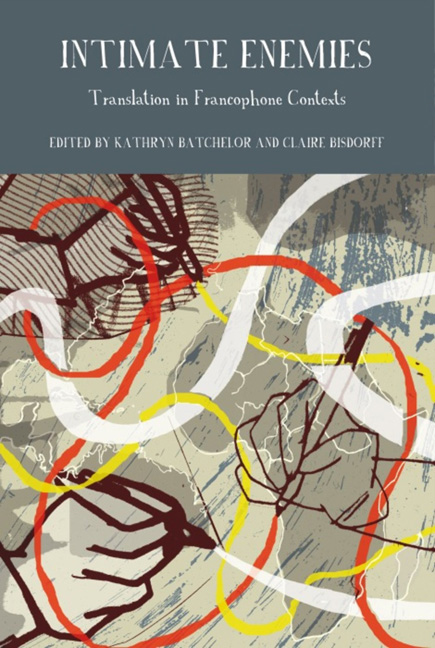Book contents
- Frontmatter
- Contents
- Illustration
- Acknowledgements
- Introduction: Translation – Formidable Enemy or Needed Friend?
- The Translation Market: Publishing and Distribution
- Literary Translation and Language Diversity in Contemporary Africa
- Translation and its Others: Postcolonial Linguistic Strategies of Writers from the Francophone Indian Ocean
- Publishing Francophone African Literature in Translation: Towards a Relational Account of Postcolonial Book History
- Publishing, Translation and Truth
- Writing and Translating in Practice
- Translation Challenges and New Avenues in Postcolonial Translation Theory
- Notes on Contributors
- Index
Translation and its Others: Postcolonial Linguistic Strategies of Writers from the Francophone Indian Ocean
from The Translation Market: Publishing and Distribution
- Frontmatter
- Contents
- Illustration
- Acknowledgements
- Introduction: Translation – Formidable Enemy or Needed Friend?
- The Translation Market: Publishing and Distribution
- Literary Translation and Language Diversity in Contemporary Africa
- Translation and its Others: Postcolonial Linguistic Strategies of Writers from the Francophone Indian Ocean
- Publishing Francophone African Literature in Translation: Towards a Relational Account of Postcolonial Book History
- Publishing, Translation and Truth
- Writing and Translating in Practice
- Translation Challenges and New Avenues in Postcolonial Translation Theory
- Notes on Contributors
- Index
Summary
Ever since the period of anti-colonial movements after the Second World War, and continuing through the period of decolonization of the 1960s, there have been movements to revalorize the use of local and indigenous languages, particularly in the context of literary expression. This was regarded as an essential part of the process of liberation from colonial dominance by the European powers, principally Britain and France, but also to a lesser extent Portugal. The movement is summed up in a famous article by Ngũgĩ wa Thiong'o, writing in the context of emergent Kenyan nationalism, as ‘Decolonising the mind’. Ngũgĩ argued that it is only by writing in African languages that African writers will be able to connect with the values of their own culture. Not all African writers agreed, however: most notably, the Nigerian author Chinua Achebe claimed that it was possible to adapt the colonial language to express the realities of the colonial situation from the point of view of the colonized peoples. Some fifty years on from the period of decolonization, it is clear that English and French remain the dominant languages of literary expression in the former colonies of Britain and France, and writing in one of the former colonial languages is often the only way to reach an international audience and to achieve some form of international recognition. Even so, the postcolonial and nationalist preference for writing in indigenous and local languages persists in the former colonies, in what has sometimes been called a situation of ‘literary diglossia’. In spite of the dominance of the colonial languages in official discourse, in the education systems, in the mass media, postcolonial writers still feel the need to defend their indigenous languages as a preferred vehicle for literary expression.
One of the interesting features of this tendency is the role attributed to literary output, as opposed to the more vehicular uses of a local language: technical, scientific, educational, etc. Literary production is seen as the expression of a particular cultural sensibility, a set of values embodied in a language and celebrated in its literary deployment. It is sometimes assumed that a literary heritage confers a special prestige, a dignity, to what might otherwise be dismissed as a local particularity, a circumscribed cultural characteristic whose relevance is limited to a particular political or geographical area.
- Type
- Chapter
- Information
- Intimate EnemiesTranslation in Francophone Contexts, pp. 36 - 48Publisher: Liverpool University PressPrint publication year: 2013

